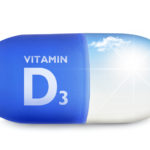As we all step out of the daily rush to slow the spread of the new coronavirus, having an optimally functioning immune system is more desirable than ever. Ensuring you have good levels of Vitamin D is possibly the best step you can take as part of your immune strategy against COVID-19.
Consequences of vitamin D deficiency
Vitamin D is both a nutrient we eat and a hormone our bodies make from exposure to sunlight. Being “D-ficient” may put you at increased risk of a host of chronic diseases, such as osteoporosis, heart disease, some cancers, as well as infectious diseases, such as tuberculosis and of course the seasonal flu and other coronavirus infections.
In the winter months the flu wreaks the most havoc and scientists have long hypothesized that low vitamin D may be a contributing factor. Adults who have low levels are more likely to report having had a recent cough, cold, or upper respiratory tract infection. Indicating that optimal levels may be particularly protective against respiratory infections.
Vitamin D and coronavirus
The coronavirus is a highly contagious respiratory infection that damages the lungs. It can enter the body via the mucous membranes; the eyes, nose and mouth. According to The World Health Organization someone with a vitamin D deficiency may be more vulnerable to respiratory infection. They report; ‘Vitamin D deficiency may affect the immune system as vitamin D plays an immunomodulation role, enhancing innate immunity by up-regulating the expression and secretion of antimicrobial peptides, which boosts mucosal defences’. A first line defence.
Sun exposure
Most of us are aware that sunlight is a key provider of Vitamin D. However even on a clear day in Ireland our sunlight is simply not strong enough to provide in the winter months. If you are dark skinned, you need even more exposure to sunlight to obtain optimal levels. As a result, deficiency is relatively common. A recent UCC study found that many as one in eight Irish people have a vitamin D deficiency. This could be even higher during winter months. With all this in mind, there has never been a better time to top up your Vitamin D levels, particularly if it is a while since you had a natural tan.
Dietary sources
So how can we get more? Few foods are naturally rich in vitamin D. The biggest dietary sources are foods that have been fortified and vitamin supplements. Good sources include dairy products and breakfast cereals (both of which are fortified), and it is naturally found in fatty fish such as salmon and sardines, red meat and in egg yolks. However, it is difficult to get enough from food alone.
You may be at increased risk of deficiency throughout the year if you are limiting dairy products. You may also be at risk if you are following a vegan diet, are dark skinned or have coeliac disease. For the general population supplementing is highly recommended in winter. Vitamin D3 is the active form and the best form to supplement.
Safe supplementation
The HSE recommend against supplementing high doses for a long period of time. They outline a dose of 1000iu daily as safe. 4000iu maybe a more appropriate dose over 8 weeks to correct a deficiency. A doctor may prescribe more to correct a severe deficiency.
If you would like help with supporting your immune system, call us on 01 4020777 or book online now.


